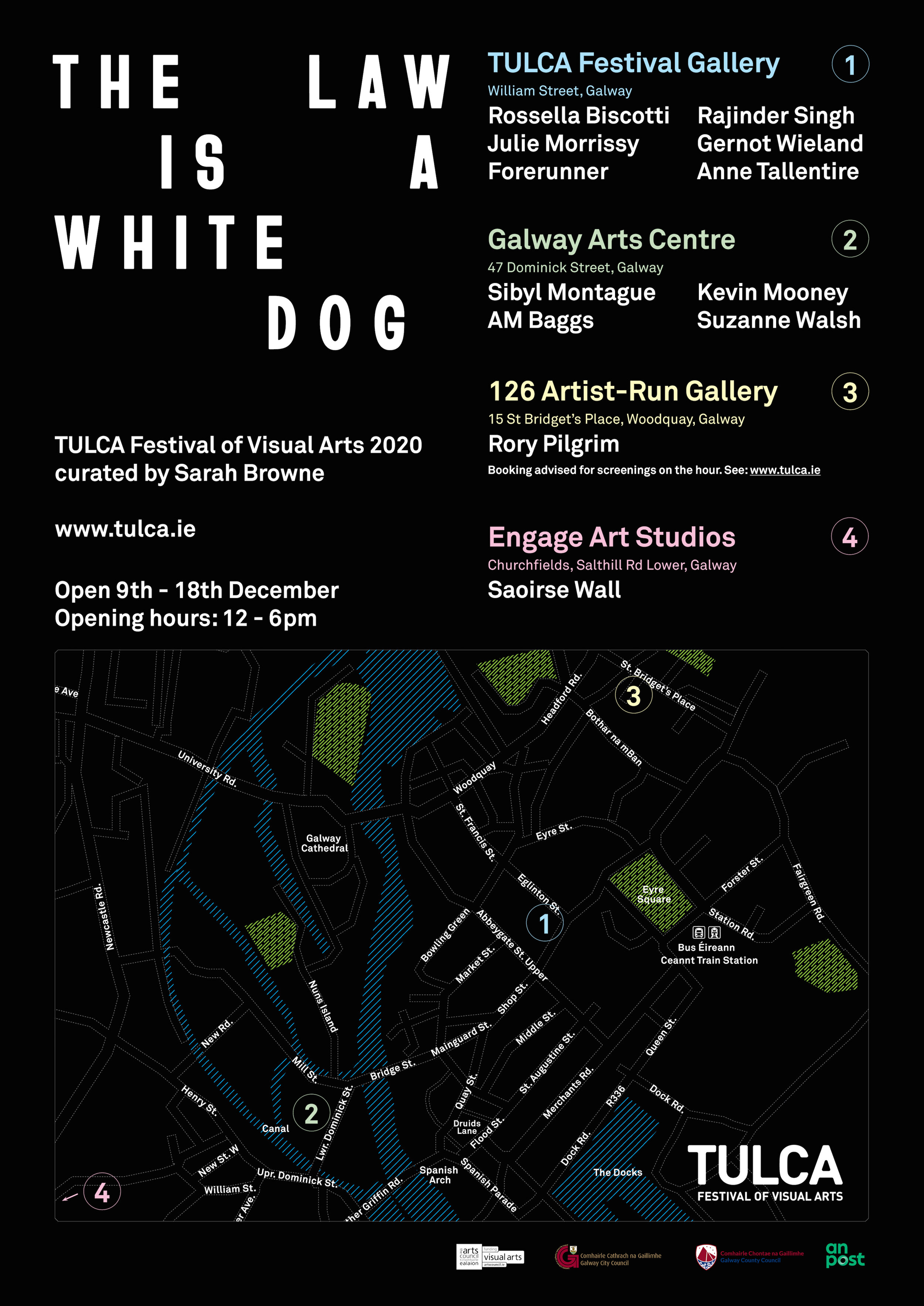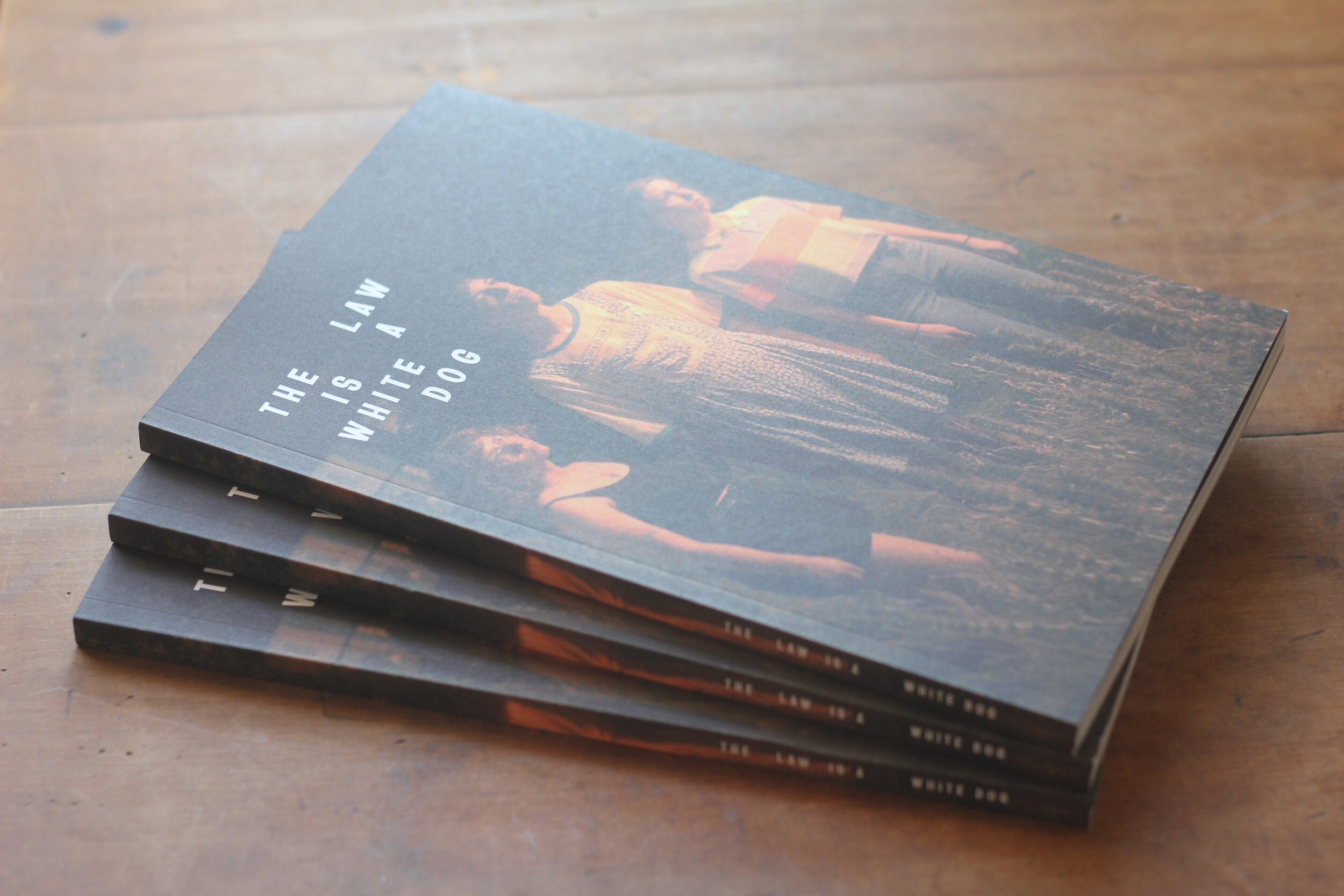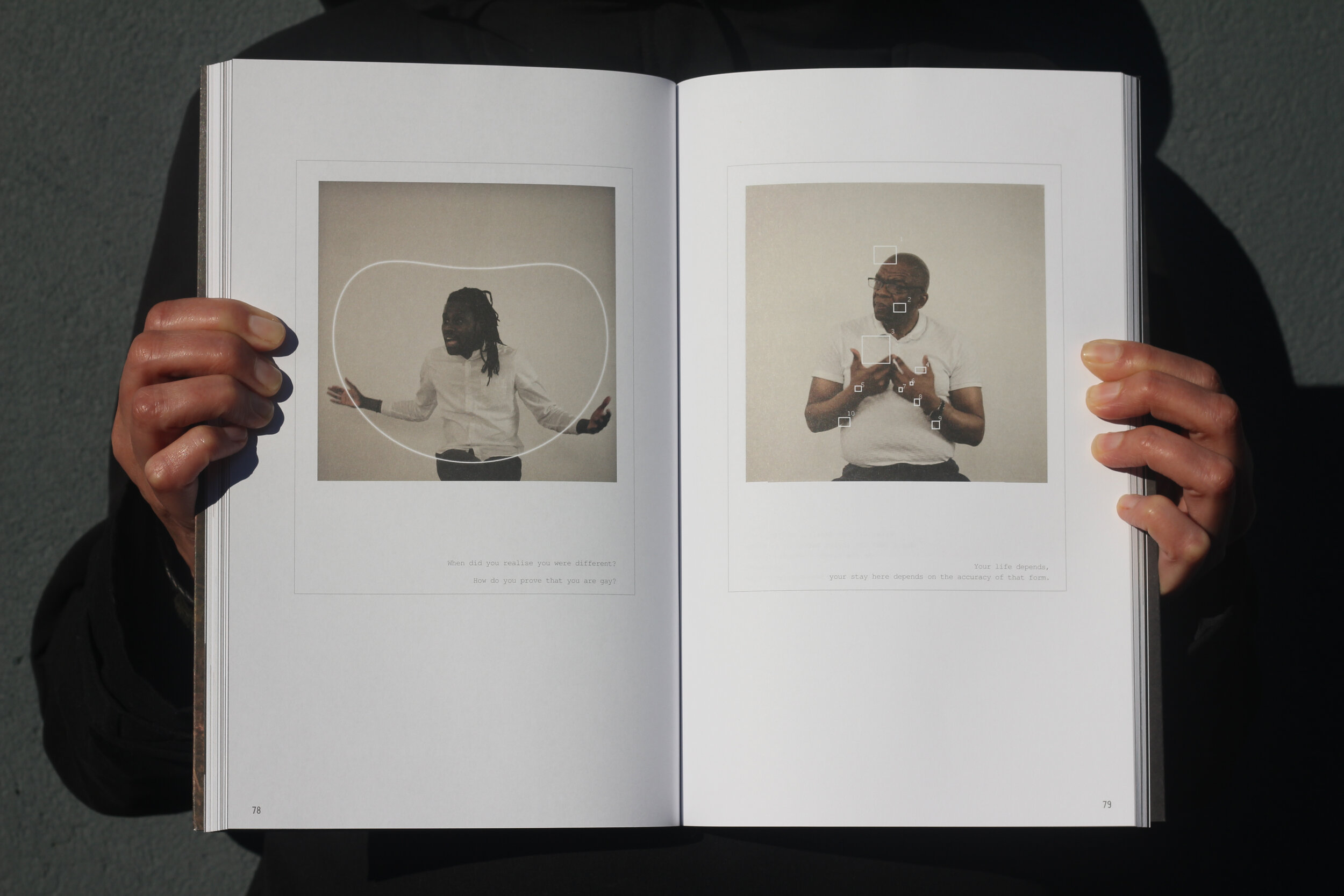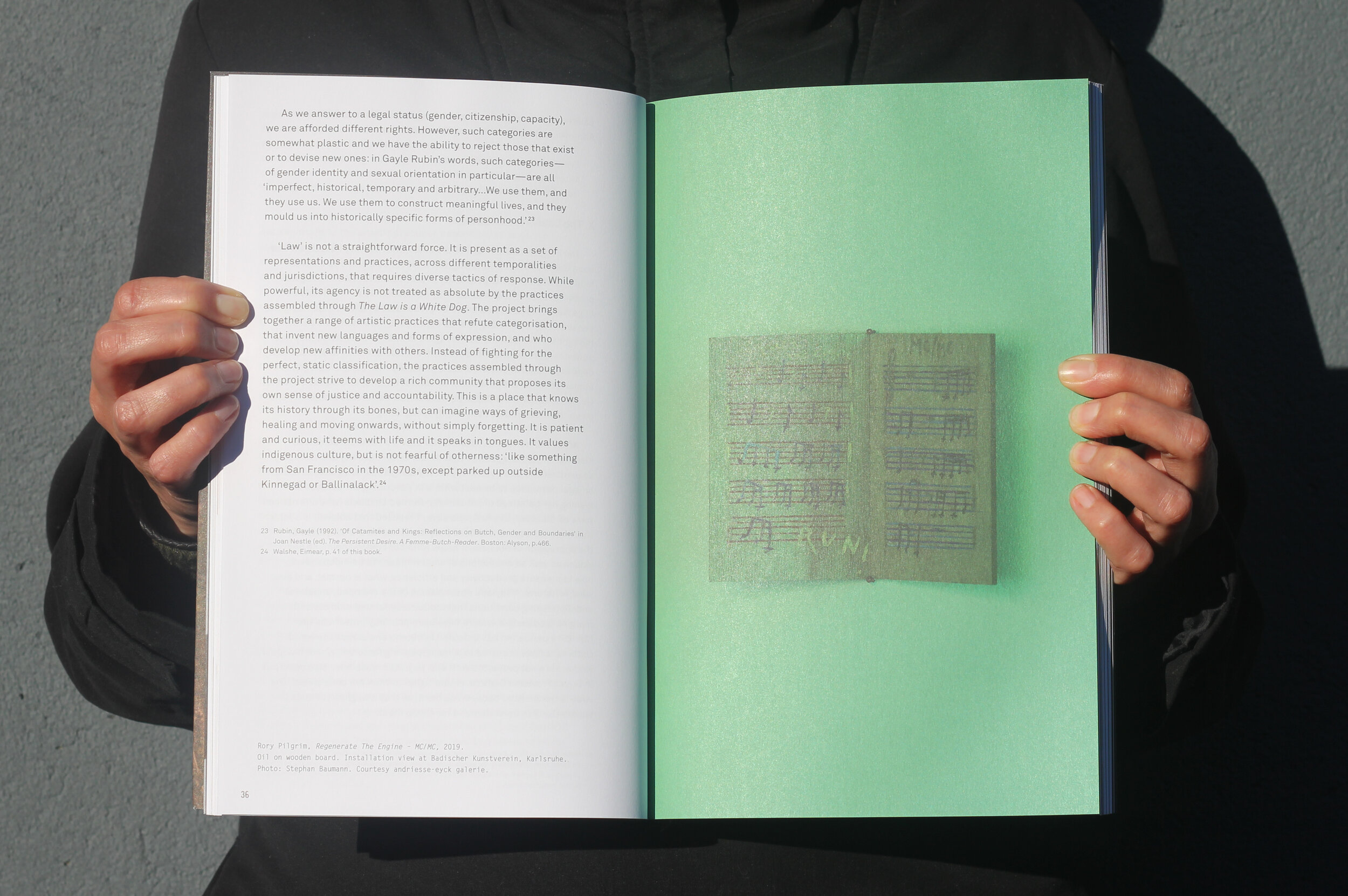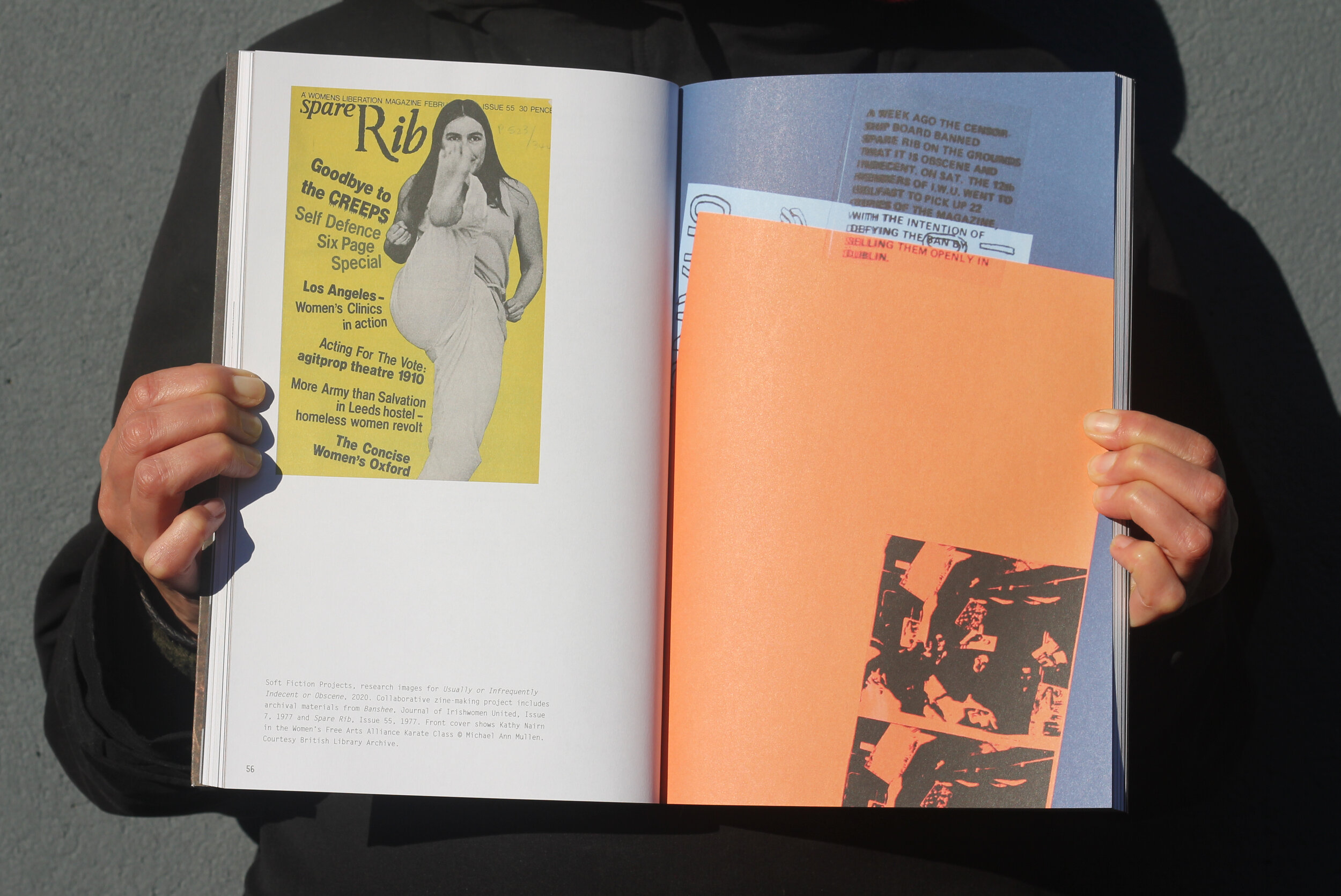Announcement: New dates for TULCA 2020
TULCA Festival of Visual Arts is delighted to announce new dates for the 2020 exhibition programme:
The Law is a White Dog
9 - 18 December 2020
Curated by Sarah Browne
The exhibition programme features 12 artist presentations, 7 of which are new commissions, and 2 artists (Gernot Wieland and Rory Pilgrim) whose work is being shown in Ireland for the first time. Thank you to our partner venues, hardworking volunteers and production team, and the contributing artists for making this rescheduled exhibition possible.
We look forward to welcoming you!
All venues are open 12-6pm daily:
TULCA Festival Gallery
Rossella Biscotti
Rajinder Singh
Julie Morrissy
Gernot Wieland
Forerunner (Tanad Williams and Andreas Kindler von Knobloch)
Anne Tallentire
Galway Arts Centre
Sibyl Montague
AM Baggs
Kevin Mooney
Suzanne Walsh
126 Artist-Run Gallery
Rory Pilgrim
*50 minute film: book here for screenings on the hour*
Engage Art Studios
Saoirse Wall
The safety and health of our visitors and workers is essential. Masks are mandatory in all indoor venues and hand sanitising will be available. Booking is recommended for Rory Pilgrim at 126 Artist-Run Gallery. Other venues will operate a one-way system and limited visitor numbers. Exhibition guides will be available in each venue and online to guide your visit.
(Screening programme to follow in 2021)
For ongoing updates, please sign up to the TULCA newsletter or follow us on social media at @TulcaFestival. For further information please contact: info@tulca.ie
TULCA Festival of Visual Arts 2020
The Law is a White Dog
Curated by Sarah Browne
Galway, Ireland
Image: Rory Pilgrim, Regenerate Maximum Crisis, Maximum Calm, 2020, oil paint and nail varnish on panel, 15,2 x 20,4 cm, courtesy of andriesse~eyck galerie
Nothing to Look Forward to But the Past | Curated by Gregory McCartney | 1 Dec 2020 - 31 March 2021
TULCA Festival of Visual Arts and Galway 2020 European Capital of Culture are delighted to present:
Nothing to Look Forward to But the Past
Curated by Gregory McCartney
Online Exhibition and Publication
1 December 2020 - 31 March 2021
TULCA Festival of Visual Arts and Galway 2020 European Capital of Culture are delighted to announce Nothing to Look Forward to But the Past curated by Gregory McCartney. This online exhibition and free print publication considers the journey of humanity as a species, and explores an imagined evolutionary path that mixes the animal and human to produce something potentially unknown and new.
The original Nothing to Look Forward to But the Past concept was of course written well before the Covid-19 Pandemic, but it somewhat eerily articulates the sudden change in everyday life and behaviour as well as our sense of being, which the virus has perhaps caused us to reassess. It is also a continuation of the Abridged obsession with actual and metaphorical viruses. Our recent issues have had titles including, Wormwood, Contagion, and Relapse.
Speaking about the project TULCA said: “The Board of TULCA Festival of Visual Arts are delighted to launch Nothing to Look Forward to But the Past online exhibition and publication as part of our UnSelfing Visual Arts programme in collaboration with Galway 2020. This programme has been reimagined and updated to comply with Public Health guidelines. We are delighted to have this opportunity to bring such inspiring artwork and an evocative publication to our audiences in this way.”
Speaking about the project Marilyn Gaughan-Reddan, Head of Programme, Galway 2020 European Capital of Culture 2020 said “The agility and determination of TULCA to reimagine the project, in light of the pandemic is remarkable, and believe that it’s concept and content is more relevant than ever, given the challenges we’re facing in 2020. We are looking forward to the presentation of a memorable exhibition, with incredible artists that global audiences can experience.”
This post lockdown re-imagining of the project sees the exhibition element move online to the www.abridged.zone website. Working with four artists: Stuart Cairns, Nadege Meriau, Daniel Seiffertand Tara Wray, the online exhibition will be accompanied by a series of essays by academics, poets, and writers exploring various aspects of the concept of personal and societal collapse: an attempt to make sense of this recent upheaval in our society and think about how this pandemic will change our journey forward and outlook for the future.
Along with the online exhibition, there will be a publication with a print run of 500. Featuring essays and more, including artworks from the exhibition plus poetry from Charlie Baylis, Peter Boyle A time of endings, Moyra Donaldson, Colin Dardis The Year of Non-Resistance, Keshia Starrett, Liam Bates, Aisling Bradley, Clare McCotter, Susannah Dickey, Yvonne Blomer, Lydia Unsworth, Soso fragments, Stephanie Burt, Stuart Cairns, Adam Crothers, Maria Finch, Jess Mc Kinney, Sharon Young, Dylan Brennan, Maroula Blades An Ancestor Guards, Anna D’Alton, Eva Griffin plus fiction from Maeve O’Lynn all responding to the Nothing To Look Forward To The Past theme.
Copies of the Print Edition will (Covid restrictions permitting) be available in Galway, Derry and Belfast plus a limited amount from Abridged.
Artists
Stuart Cairns is a Belfast-based artist who works with natural materials and found objects picked up on his ‘wanderings’. Working as a silversmith, Cairns combines these natural materials and found objects alongside precious metals to create artefacts in the tradition of tableware and domestic objects. Here he presents Hinterlands, influenced by his journeys around his local coastal area.
Nadege Meriau, a French, London based artist whose experimental practice is principally photographic, but encompasses sculptural installations and video work. Best known for her use of organic matter - bread, chicken carcasses, honeycomb - her visceral and sensuous imagery both seduces and disorientates. Spaces are ambiguous and scale is distorted. For each piece Mériau exercises both control and restraint, manipulating and coaxing her materials into certain behaviours or forms, whilst simultaneously allowing nature to take its course. For this project she presents In These Times, They Who Eat My Flesh and The Fall.
Tara Wray is a photographer, curator, and filmmaker. Her work is autobiographical in nature and focuses on issues of mental health and the ambivalence of family ties. And dogs. She makes art to understand the world around her and to define her place within it. Her sold out photobook, Too Tired for Sunshine, was published by Yoffy Press in 2018. Recently she founded the Too Tired Project, a non-profit photo initiative helping those struggling with depression by offering a platform for collective creative expression and community. We present Everything All The Time Never Enough, a beautifully abstract look at our contemporary existence.
Daniel Seiffert, influenced by his political studies, tends to document the true and the real in his photographs. Many journeys prior to and during his artistic career also influenced his worldview and strengthened his desire to preserve time and space. In Raufaser he wants to raise awareness of how the aftermath of war and crisis can affect the generations that follow and examine how collective and individual memory is shaped and influenced. He is creating a new sense of identity by confronting his relationship with the past, spanning four generations, providing the basis for a detailed investigation of post-memory, mental health, war and history.
About UnSelfing
In 2020, TULCA Festival of Visual Arts has created a special programme of visual arts events for the occasion of Galway 2020 European Capital of Culture 2020. This programme is called ‘UnSelfing’. Taking the theme of Journeys, both exterior and interior, ‘Unselfing’ refers to the idea of going outside of oneself in order to find truth. The writer Iris Murdoch, who was born in Ireland in 1919, contributed much to the field of philosophy, including the idea of ‘unselfing’, or, to turn one’s attention outward, away from the self and into the world and nature in order to see things as they really are rather than from a self-centred perspective. Due to the Covid-19 pandemic in 2020, many of the events, exhibitions, and commissions for UnSelfing have been changed and adapted to comply with public health advice. A programme of upcoming events is available at www.tulca.ie and www.galway2020.ie
About Galway 2020 European Capital of Culture
Galway is European Capital of Culture in 2020. Due to the impact of Covid-19 the cultural programme has been reimagined, with local and national artists and cultural organisations that won Galway the European Capital of Culture designation remaining at its core. The ambitious programme comprises both digital and live events which take place across the villages, towns, islands and the city of Galway and offers theatre, music and sport, to poetry, film, visual art and much more. The reimagined programme will run until the end of March 2021.
Image: Tara Wray, from the Everything All The Time Never Enough series, 2020, courtesy of the artist.
www.tulca.ie
The Law is a White Dog | New book by TULCA Publishing
Book: The Law is a White Dog
This limited edition book is published on the occasion of TULCA Festival of Visual Arts, 2020, titled The Law is a White Dog. Curated and edited by Sarah Browne, the book features a richly-illustrated introductory essay which frames a wide range of newly commissioned writing, imagery and other original research by artists, poets, activists and lawyers.
Contributions include poetry by Julie Morrissy, photography by Rajinder Singh, and an illustrated essay by Eimear Walshe. The contribution by Justice for Magdalenes Research is an oral history of Margaret Burke (a pseudonym), a survivor of Lenaboy Industrial School and the Magdalene Laundry in Galway whose testimony was also presented to the UN Committee Against Torture in 2011. The book also presents extracts from two intergenerational projects concerned with feminist activism: artist duo Soft Fiction Projects contribute a selection of censored periodicals from the 1970s they are using to develop a collaborative zine with a group of young people in Galway. Caroline Campbell (Loitering Theatre) presents ‘Protest Archive’, a feminist folklore enquiry made in collaboration with ageing activists. The book closes with new writing by Máiréad Enright, a Reader in Feminist Legal Studies at Birmingham Law School whose research extends beyond traditional methods of law reform to consider illegality, protest and experimental legal drafting. Her essay explores how the imagery of dogs roams across testimonies of institutional abuse in Ireland, and how survivors insist on forms of repair, accountability and truth-telling that might one day redeem both the law and the state that underwrites it.
Together, this creative and unruly collection speaks of a refusal to be restricted by categorisation, and the necessity (through law or art) to invent new languages and forms of expression in order to develop affinities and solidarity with others.
The book is paperback with folded cover, full colour illustrated, 28 x 18cm and 146 pages. Designed by Pure Designs.
AVAILABLE TO ORDER NOW
THREADS | Austin Ivers | Curated by Sarah Searson | The Dock | 14 Nov 2020 - 6 Feb 2021
TULCA Festival of Visual Arts and Galway 2020 European Capital of Culture in association with The Dock present:
THREADS | Austin Ivers
Curated by Sarah Searson
The Dock, Carrick-on-Shannon
14 November 2020 - 6 February 2021
To mark its 18th year, TULCA has invited three alumni curators: Sarah Searson (The Dock, Leitrim), Gregory McCartney (Abridged, Derry) and Helen Carey (Fire Station Artists’ Studios) to curate a series of exhibitions as part of the festivals UnSelfing Programme for Galway 2020 European Capital of Culture.
THREADS curated by Sarah Searson presents a new body of work by Galway-based artist Austin Ivers. The exhibition launches on Saturday 14th November with a filmed, virtual tour, including contributions from curator Sarah Searson and artist Austin Ivers. The exhibition consists of a new multi screen video work titled The World at War, photography and installed objects, along with a programme of screenings, readings and a publication to document these events. In the event of restrictions being lifted, the exhibition will open to the public.
Ivers works in a variety of media, including, video, photography and installation. He has exhibited extensively including several solo shows in Ireland and group exhibitions in 126 Artist-Run Gallery Galway, RHA Dublin, Catalyst Arts Belfast, as well as Graz, Kiev, Philadelphia and Friedrichshafen. Ivers teaches at Galway Mayo Institute of Technology and was a founder member of 126 Artist-Run Gallery in Galway.
Referencing the 1983 documentary-style drama, Austin Ivers considers some technological developments of the post-war period and their subsequent application in state command and control systems during the Cold War. Utilising video, sculpture and photography, this is a consideration of the relationship between the aesthetic of power and life as experienced under the perpetual threat of nuclear annihilation.
Speaking about this new body of work, Ivers said, “As an adolescent, the world appeared to be perpetually teetering on collapse. Nihilistic popular culture, aided by actual events, promised the end of everything, all the time. Obviously, this was facilitated to no small degree by the emergence of domestic VHS technology. Much like contemporary parents are scared stupid by the internet and the access (and understanding) their children have to it, my generation had video, “under the counter” tapes, video nasties and the world of cheap-to-licence B-movies (as well as art classics) at our disposal. We were obviously in a demented frenzy as we had equal access to The Hills Have Eyes, THX 1138, Eraserhead, The Omega Man, Soylent Green, Zardoz, A Boy and His Dog, Logans Run, Damnation Alley, Dawn of the Dead, Alien, Blade Runner, Terminator, Brazil, etc... and we were still asked to program the video recorder, which was like magic to our parents.
The above are reference points. My sense of these times is that objects will not survive the common cultural memory but instead images will: children won’t remember their phones, as they’re almost disposable now but they will remember their apps, their skins. Things, actual things are now disposable and the value that might once have been in a cassette or a book or a garment is now located in a string of curated experiences. But much of me and my sense of being in the world (and interpreting the world) is located in objects. Not for (or from) memory but in an ongoing now.”
Speaking about this exhibition the TULCA Board of Directors said, “Focussing on identity as brokered through objects; the really real, presents a refreshing tonic to our own increasingly unreal and hyperreal contemporary moment. Having created a space that shelters emerging art practices in Galway, we are excited that our UnSelfing programme can be shared with national and international audiences in this exhibition by Austin Ivers, carefully curated by Sarah Searson.”
Head of Programme for Galway 2020, Marilyn Gaughan-Reddan said, “Galway 2020 are delighted to partner with TULCA Festival of Visual Arts UnSelfing, an inspiring programme of exhibitions, performances and encounters with visual art taking place in Galway and across Ireland throughout 2020 and into 2021. As part of the UnSelfing programme, Austin Ivers will be presenting THREADS, an insightful body of work and one which we are delighted to share with our audiences.”
THREADS opens this Saturday 14 November and runs until 6 February 2021 in The Dock Arts Centre, Carrick-on-Shannon. In the event of restrictions being lifted, the exhibition will open to the public.
Exhibition Associated Events:
New Writing Commissions
Online Film Screenings and Talks
Dates to be announced soon
www.tulca.ie
Image: Austin Ivers, HP85a, dye sublimation print on aluminium (2020), courtesy of artist



